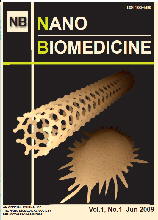
Nano Biomedicine
ORIGINAL ARTICLE
An Attempt to Study of the C60 Fullerene on Differentiation of Mouse ES cells
Koichi IMAI1, Fumio WATARI2, Tetsunari NISHIKAWA3, Akio TANAKA3, Akito TANOUE4,
Kazuaki NAKAMURA4, and Hiromasa TAKASHIMA5
1Department of Biomaterials, Osaka Dental University, Osaka, Japan
2Graduate School of Dental Medicine, Hokkaido University, Sapporo, Japan
3Department of Oral Pathology, Osaka Dental University, Osaka, Japan
4Department of Pharmacology, National Research Institute for Child Health and Development, Tokyo, Japan
5Hatano Research. Institute, FDSC, Kanagawa, Japan